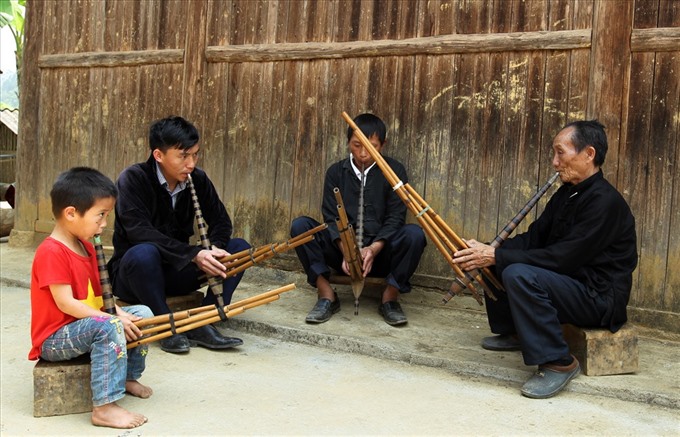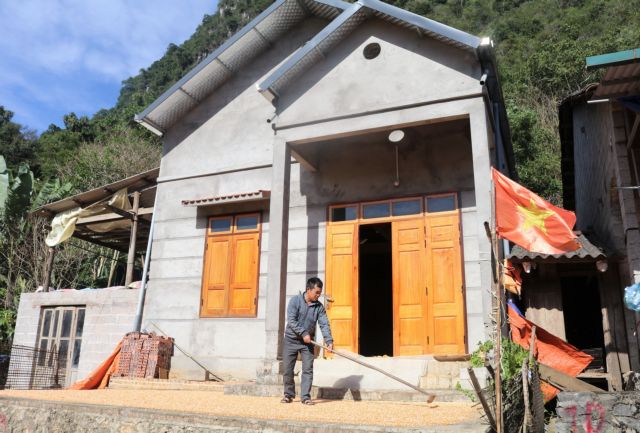

An old man in Lào Cai Province is a panpipe expert. In fact, people call Thào A Dín “the panpipe king of the Xênh Mùa Ca highlands”.
 |
| Dedicated artist: Although his health is worse now, Dín (R) still teaches young people in the village. — Photo laodong.vn |
An old man in Lào Cai Province is a panpipe expert.
In fact, people call Thào A Dín “the panpipe king of the Xênh Mùa Ca highlands”.
He is eighty-five this year and he is teaching his five-year-old grandson to play the instrument.
Thào A Dín often plays at funerals.
by An Vũ and Mộc Miên
Deep in the rural district of Xênh Mùa Ca, home to the Mông ethnic people in Lào Cai Province, lives a kind-hearted old man who plays a melodious panpipe that bewitches fellow villagers and passersby.
Thào A Dín, dubbed “the panpipe king of Xênh Mùa Ca highlands”, turns 85 this year.
As we walk along a curved road toward Sín Chéng Hamlet on a rainy day, villagers were happy to show us the way to his house, even though they were hurrying to harvest their crops. They led us to the bottom of the terraced fields of Sín Chải Village.
When we arrived, he was holding a panpipe and sitting on an old wooden chair. He meticulously pointed out every move to his 5-year-old grandson, who is learning to play. Dín suddenly touched the instrument and like magic, the panpipe seemed to come awake after a long sleep.
He said that in the mountain where he comes from, the unborn children listen to the panpipe sounds made by their fathers playing. When they grow up, they learn how to carry the panpipe, following their mothers up to the terraced fields and their fathers down to the market to eat thắng cố, a local soup specialty made from horse meat.
“The sound of the panpipe became my childhood friend. Living in that culture, the sound became a part of my blood,” said Dín.
By the time he was 10, he had learned how to blow the first note in a panpipe song. At 12, he asked his father’s permission to travel to Xín Mần District in the neighbouring province of Hà Giang to learn from Thào A Pao, who was then called “the God of pan pipe”.
At 17, Dín danced skillfully to the sound of panpipe. After finishing his education, he returned to his homeland and applied his knowledge to serving his community.
The 85-year-old dances with folk artists in all hamlets of Si Ma Cai such as Cán Cấu, Mản Thẩn and Nàn Sán. Wherever he goes, he wins the respect and admiration of people. Villagers have called him “the maestro of panpipe”.
He is often asked to be the host of local funerals and other spiritual activities.
While dancing for us to a song he calls Crossing the Sea, bidding goodbye to a dead man and seeing him off to his ancestors, Dín explains that this is his most-performed song and the story it tells has long pre-occupied him.
“This song describes the voyage of crossing the sea of the Mông. During the funeral, the panpipe sound takes the spirit of the dead man across the sea and back to where he was born. In the song, there are sentences like ‘because of being old, the man dies. His family should not be in much pain. Please rest in peace’.”
Dín said death is an eternal sleep. In the funeral traditions of the Mông, the panpipe sound will show dead people’s spirits to the other side of the world. It is also considered an instrument to help the living express their feelings to the dead.
Though he has mastered 150 songs written for panpipe, 50 folk songs on love and family, 15 national martial arts dances and 50 fairy tales of the Mông, he feels especially attached to the funeral songs.
When he was over 55, his health weakened, so stopped dancing as much but start teaching. To watch the way he cherishes his old panpipe is enough to see how valuable it is to him.
“The Mông like to blow the panpipe, dance with it and listen to its sound, as it shows the history of a nation, motherhood, brotherhood and the lifestyle of the people. We need to preserve it all the time. It is difficult to learn so we need passion and patience. I am always worried young people will lose passion for it, so I’m trying to teach them everyday. I will do it until the day I die,” he adds.
At present, he has 155 students. The youngest one is 5-year-old Thào A Phòng. Giàng A Chứ, another student, said, “As a youngster, I love my folklore culture. I am taught by Dín and I like it so much. I will try to learn them all.”
In 2013, the province’s Department of Culture, Sports and Tourism invited him to co-operate in the project of Restoring and Teaching the Panpipe Dance of the Mông People at Sín Chéng.
In November of 2015, he was also named a "Master Folk Artist" by the Chairman of the National Assembly of Việt Nam.
Now, thanks to Dín, the sound of panpipe echoes through the mountains, and will keep vibrating for years to come. VNS
GLOSSARY
Deep in the rural district of Xênh Mùa Ca, home to the Mông ethnic people in Lào Cai Province, lives a kind-hearted old man who plays a melodious panpipe that bewitches fellow villagers and passersby.
Melodious means pleasant-sounding.
As we walk along a curved road toward Sín Chéng Hamlet on a rainy day, villagers were happy to show us the way to his house, even though they were hurrying to harvest their crops.
A hamlet is a very small village.
When they grow up, they learn how to carry the panpipe, following their mothers up to the terraced fields and their fathers down to the market to eat thắng cố, a local soup specialty made from horse meat.
A specialty is a type of food someone, or several people in a certain area, is known for making well.
At 12, he asked his father’s permission to travel to Xín Mần District in the neighbouring provine of Hà Giang to learn from Thào A Pao, who was then called “the God of pan pipe”.
If you are given permission to do something by someone in power, you may then go ahead and do it.
Wherever he goes, he wins the respect and admiration of people.
If you have respect for someone, it means that you look up to that person and give him, or her, power.
Admiration is the act of giving respect and warm approval.
Villagers have called him “the maestro of panpipe”.
A maestro is a music conductor.
While dancing for us to a song he calls Crossing the Sea, bidding goodbye to a dead man and seeing him off to his ancestors, Dín explains that this is his most-performed song and the story it tells has long pre-occupied him.
Bidding goodbye means saying goodbye.
Your ancestors are your parents, grandparents, great grandparents and so on.
Dín said death is an eternal sleep.
Eternal means forever.
It is also considered an instrument to help the living express their feelings to the dead.
To express your feelings means to show them.
To watch the way he cherishes his old panpipe is enough to see how valuable it is to him.
To cherish something means to hold on to it and not give it away, or throw it away, because you love it.
“It is difficult to learn so we need passion and patience.”
Patience is the ability to wait without getting wound up and upset.
At present, he has 155 students.
At present means now.
In 2013, the province’s Department of Culture, Sports and Tourism invited him to co-operate in the project of Restoring and Teaching the Panpipe Dance of the Mông People at Sín Chéng.
Co-operate means work together.
Now, thanks to Dín, the sound of panpipe echoes through the mountains, and will keep vibrating for years to come.
Vibrating means making a long-lasting shaking movement.
WORKSHEET
Find words that mean the following in the Word Search:
o | i | m | o | y | r | u | j | s | g | u | d |
h | t | b | s | e | n | i | g | h | t | e | l |
a | p | h | t | p | d | y | t | d | o | y | r |
m | a | s | i | k | g | e | r | a | l | o | a |
l | i | v | b | o | v | r | y | n | r | l | i |
e | e | h | f | l | u | r | t | c | e | n | n |
t | s | a | e | s | r | i | d | i | e | b | y |
s | f | w | b | e | b | o | o | n | a | c | m |
s | t | e | a | c | h | i | n | g | n | d | m |
b | r | w | c | a | m | b | o | d | i | a | r |
© Duncan Guy/Learn the News/ Viet Nam News 2018
1. Twelve; 2. Teaching; 3. Dancing; 4. Hamlets; 5. Rainy.









